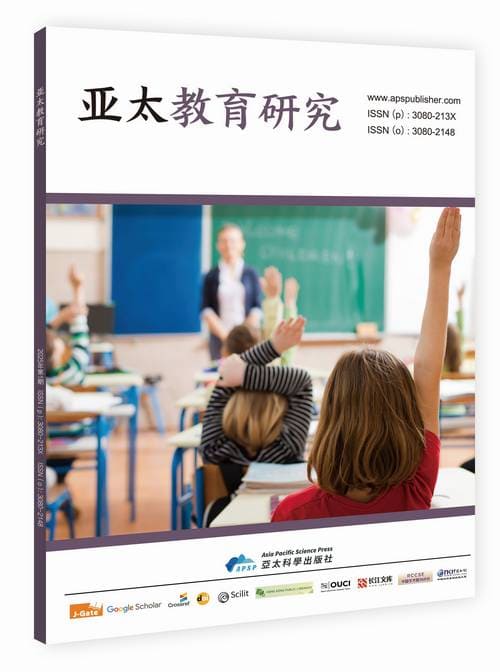人工智能在大学生英语学习中的个性化应用
DOI:
https://doi.org/10.62177/aper.v1i3.427关键词:
人工智能, 大学英语, 个性化学习, 学习进度, 兴趣图谱摘要
人工智能技术通过整合信息驱动机制与学习进度跟踪,为大学英语学习构建了个性化新范式,在此背景,本研究聚焦于自然语言处理学习分析及自适应系统等AI技术,深入解析AI技术在大学生英语学习个性化学习过程中的具体实践路径,这些路径具体体现在:1)通过每位同学的动态学习档案,实时监测学生能力短板,优化学习路径;2)根据学生在线学习行为数据分析,设计主题任务,构建兴趣图谱,增强学生语言学习兴趣;3)建立短期适配结合长期规划和游戏化激励的多元学习机制,以平衡语言学习认知负荷,增强学生学习动机。本研究主要采用了深度案例分析为主的定性研究方法和实验设计为主的定量研究方法相结合的综合研究法。研究结果显示人工智能的引入,能够显著提升学生在线上及课堂场景中的英语学习投入度,增强学生语言学习内在驱动力,从而在真正意义上实现“因材施教”,构建以兴趣为导向的高校公共英语教育。
参考
Flamm K. Creating the computer: Government, industry, and high technology [M]. Washington, D.C.: Brookings Institution Press, 1988.
Coppin B. Artificial intelligence illuminated [M]. Sudbury, MA: Jones and Bartlett, 2004.
Timms M J. Letting artificial intelligence in education out of the box: Educational cobots and smart classrooms [J]. International Journal of Artificial Intelligence in Education, 2016, 26(2): 701–712. DOI: https://doi.org/10.1007/s40593-016-0105-0.
Rus V, D’Mello S, Hu X, et al. Recent advances in conversational intelligent tutoring systems [J]. AI Magazine, 2013, 34(3): 42–54.
Kahraman H T, Sagiroglu S, Colak I. Development of adaptive and intelligent Web-based educational systems[A]. Proceedings of the 4th International Conference on Application of Information and Communication Technologies[C]. Piscataway, NJ: IEEE, 2010: 1–5.
Chassignol M, Khoroshavin A, Klimova A, et al. Artificial intelligence trends in education: A narrative overview [J]. Procedia Computer Science, 2018, 136: 16–24. DOI: https://doi.org/10.1016/j.procs.2018.08.233.
Cobo A. Artificial intelligence in education: A review [J]. IEEE Access, 2020, 8: 183895–183909. DOI: https://doi.org/10.1109/ACCESS.2020.3028351.
健涛. 人工智能时代英语口语教学模式变革 [J]. 教学与管理, 2019(12): 86–88.
Li X, Zhang Q, Zhao Y. Personalized learning: AI for education [J]. International Journal of Educational Technology, 2019, 11(1): 1–14.
Hui, L. (2023). Effects of an AI-based speaking application on Chinese EFL learners’ speaking competence. International Journal of Computer-Assisted Language Learning and Teaching (IJCALLT), 13(1), 1–21. https://doi.org/10.4018/IJCALLT.320297
Zou, D., & Xie, H. (2022). A systematic review of research on adaptive language learning: A technology-enhanced learning perspective. Educational Technology Research and Development, 70(4), 1381–1413. https://doi.org/10.1007/s11423-022-10129-y
Yang, Y., & Lee, J. (2024). Understanding university students’ continuance intention to use a gamified AI-driven language-learning app: An extension of the technology acceptance model. Education and Information Technologies, 29(3), 3329–3354. https://https://doi.org/10.1007/s10639-023-12053-7
Li, J., & Wah, L. K. (2023). The impact of using an AI-based chatbot on students’ self-regulated learning in a university English writing course. Education and Information Technologies, 28(11), 15449–15467. https://doi.org/10.1007/s10639-023-11883-7
Anderson C, Kerr P. Machine learning in education: Real-world applications and challenges [J]. Journal of Educational Technology & Society, 2021, 24(3): 45–58.
Chen L, Huang S. Learning analytics for personalized English learning: A case study of college students [J]. Computer Assisted Language Learning, 2021, 34(6): 789–805. DOI: https://doi.org/10.1080/09588221.2021.1921745.
Zheng X, Li R, Wang Y, et al. Adaptive learning systems in higher education: A meta-analysis of student engagement [J]. Educational Technology Research and Development, 2021, 69(4): 2103–2122. DOI: https://doi.org/10.1007/s11423-021-10004-9.
Li M, Wang T. Interest-driven learning in EFL contexts: A longitudinal study [J]. Language Learning & Technology, 2020, 24(2): 102–119.
Kumar R, Rose C P. Conversational agents for language learning: Design and evaluation [J]. International Journal of Artificial Intelligence in Education, 2021, 31(2): 245–278. DOI: https://doi.org/10.1007/s40593-020-00236-w.
Yang J, Wong L H. Personalized learning pathways in higher education: A framework for AI integration [J]. Computers & Education, 2022, 180: 104432. DOI: https://doi.org/10.1016/j.compedu.2021.104432
Deterding S, Dixon D, Khaled R, et al. Gamification: Toward a definition[A]. Proceedings of the 2011 CHI Conference on Human Factors in Computing Systems[C]. New York: ACM, 2011: 1–4.
Downloads
How to Cite
期
栏目
License
Copyright (c) 2025 龚晓芳

This work is licensed under a Creative Commons Attribution-NonCommercial 4.0 International License.
DATE
Accepted: 2025-06-16
Published: 2025-07-07
















